In the "Essence of Theater" corner by "Waseda Shogekijo Drama-kan Theater" and "Waseda Weekly", we feature Waseda University graduates who are active in various fields and have connections to play, with the keywords "introduction to play" and "using words that can be understood by everyone". They will talk about the appeal of play. This time's guest is Ryuichi Kodama (Professor Faculty of Letters, Arts and Sciences), who has been the director of the Theater Museum since April of this year. After being obsessed with Kabuki as a boy, he now specializes in Kabuki research and criticism. What is the charm of Japanese traditional culture, Kabuki? And what should students do now? He gave us many hints.
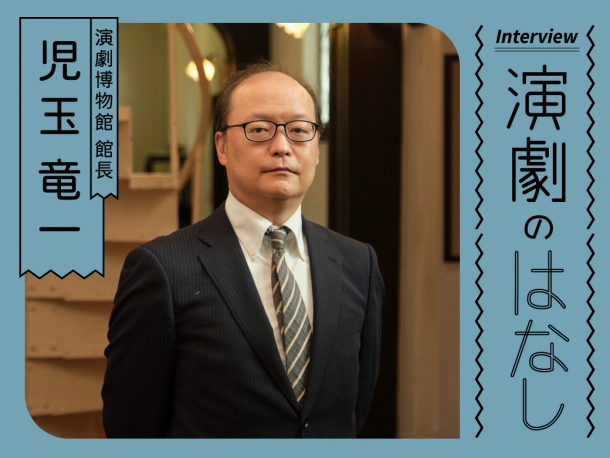
Ryuichi Kodama: Born in Hyogo Prefecture. Completed Graduate School of Letters, Arts and Sciences. He assumed his current position after serving as a research Research Associate Waseda University and a researcher at the National Research Institute for Cultural Properties in Tokyo. Specializing in Kabuki research and criticism, he teaches classes such as "Introduction to Theater Research'' and "History of Japanese Theater.'' Director of the Theater Museum from April 2023.
I want you to feel both the commonalities that transcend time and the differences in culture when you go to the theater.
--As the theater museum director, what do you want to convey to students about what the theater experience brings?
It's like having another person act out their "raw life'' right in front of your eyes. Whether it's a book experience, a movie, or a play, the benefit of coming into contact with art that recreates a story is that you get a glimpse of the life that could have been, or the life that couldn't have been for you, during your whole life.
Among them, in the case of theater, it is “live” and “only once”. I think the most appealing thing about play is that people who exist in the same space and spend time as the audience can act out a different life in front of their eyes.
--There are a wide range of theater genres, including puppet shows and musicals, but Prof. Kodama specializes in Kabuki. Please tell us again about the appeal of Kabuki.
For example, in the case of contemporary drama, it is often the case that the same program looks different each time it is performed, or new discoveries are often made by performing a past masterpiece with a new interpretation.
In the case of classical plays like Kabuki, the range of discovery is even greater. Even though hundreds of years have passed since the Edo period, there is a part that feels like "it's the same as us living today,'' and on the other hand, there's a part of me that feels like it's an entirely different culture, like "modern people would never be able to come up with this idea.'' I think this is what is so interesting about not only Kabuki, but also classical theater and classical literature.
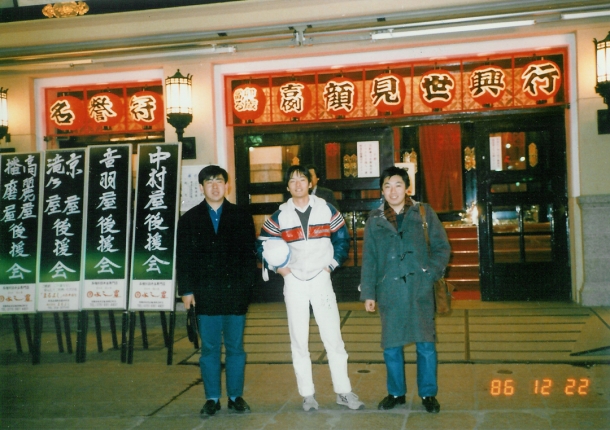
At the Minamiza Theater in Kyoto when Prof. Kodama was a first year university student (he is in the center). "I became interested in the play "Chushingura'' when I was young, and my interest in Kabuki grew as I bought monthly magazines, watched theater broadcasts, and went to theaters during long holidays. (Prof. Kodama)
--Is that why Kabuki is recognized as a UNESCO "World Intangible Cultural Heritage''?
Kabuki actors learn how to express and show their body, but there are actually very few plays overseas that maintain this tradition. Whether it's a Greek tragedy or a Shakespearean play, the script is passed down continuously, but the "how to act'' is not. People who are more familiar with the history of overseas theater and culture will naturally respect Noh, Kyogen, and Kabuki for their physical traditions. On the other hand, it is very unfortunate that many Japanese people do not know its value.
There is an episode that when Utaemon Nakamura VI (1917-2001) passed away, foreign newspapers published very large obituary articles, but Japanese people living overseas were surprised and asked, "What's going on?'' There is a huge difference in the perception of theater between Japan and Europe and America.
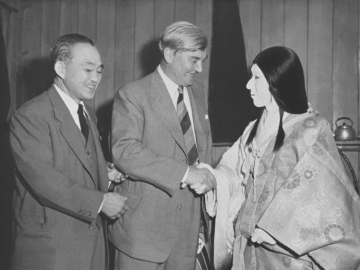
Utaemon Nakamura VI shaking hands with members of the British Labor Party who visited Japan in 1954 (Photo provided by Kyodo News)
Additionally, like ballet in Russia, opera in France, and Shakespeare in England, Kabuki is not sponsored by the state and is purely commercial theater. In that sense, it's similar to a Broadway musical. In other words, Kabuki is always faced with the extremely difficult task of maintaining its old traditions, incorporating modern elements, attracting audiences, and generating revenue in order to survive.
Nowadays, there are no such things as "Fujiyama" or "Geisha," and when it comes to Japan's world-class culture, it tends to be limited to manga, but if Japanese people don't know that there are other excellent arts and cultures in Japan, it cannot be helped, right?

Ginza/Kabukiza
Experience diving in as a beginner while still a student
--For Prof. Kodama, when do you feel the value of the theater experience?
Maybe it was when I was fascinated by an actor's performance. The innocence of an actor who made his impressive debut at a young age. The moment when a mediocre actor suddenly improves around the age of 40 to the point where you wonder, `"What happened!?'' Or, you might think that old actors in their 70s gave performances that make you think, "This is their last performance...'' and then, in their 80s, you realize, "Isn't this the best performance ever?'' There are many discoveries. I think that's the benefit you get from watching it for a long time.
――I get the impression that people who have a habit of going to theater while still a student will enjoy the "benefits of watching for a long time.''
That's exactly right. That's why it's a good idea to get into the habit of going to the theater while you're still a student. Once you reach a certain age, it's hard to switch over and think, "Maybe I should go see a play.'' I want students to have the experience of jumping in as a beginner.
This is true not only in theater but in all kinds of worlds. Naturally, jumping into something without knowing it makes you feel anxious and embarrassed. However, student days are a period when you can still be forgiven even if you are embarrassed. It is a privilege of being a student to be able to jump into various fields and areas even though I am just a beginner.
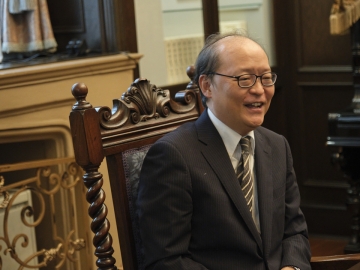
At Waseda University The Tsubouchi Memorial Theatre Museum, Waseda University
--However, there are many students who feel that there are barriers to Kabuki.
Anyway, it doesn't matter what kind of work it is, it's best to go see it in person. If you don't go see it, you won't find anything that interests you. Naturally, in any culture or art, there are things that are right and wrong. If it doesn't suit you, it's okay to feel that your connection with Kabuki ends there.
I am often asked, "What programs are suitable for beginners?" However, there are no programs "for beginner'' that are common to all people who have accumulated a wide variety of experiences! For example, it would be difficult to ask, "What type of lover is perfect for beginners?", and there probably isn't such a type in the first place. It's the same.
I often hear people say, "It's difficult to get started," but I think that's the stupidest word in the world. In the first place, the unfamiliar world is difficult for everyone. For example, for me, the array of manga at a bookstore is quite complex, and as someone who is not used to manga, it is very difficult for me to get into it. However, most people won't say that manga is difficult to read. You don't have to deal with adults who pretend to be on the side of young people and say things like "Kabuki is too difficult to enter."
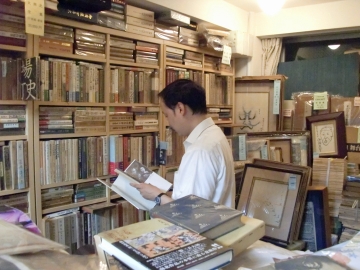
At Kobikido Shoten, a used bookstore specializing in Kabuki in Ginza that he often visits.
--Can we use the Japan Digital Theater Archives (JDTA), which has been spearheaded by the Theater Museum, as an entry point?
I agree. JDTA introduces various plays in approximately 3-minute excerpts. You can watch them one after the other, or you can search by playwright name, actor name, or work title you've heard of.
As I said earlier, it's difficult to jump into a world you know nothing about. But what I want everyone to remember is that over the past 20 years of my life, I must have jumped into this many times. Just knowing someone's face or name can be a great opportunity. I think it's a good idea to feel a connection, even if it's just a small connection, and dig deeper from there.
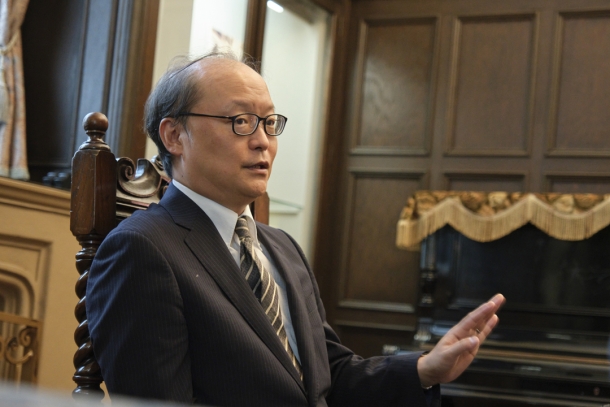
Interview and text: Oguma Naoto (Graduated from School of Letters, Arts and Sciences II in 2002)
Photography: Seiji Ishigaki
Image design: Ryo Uchida

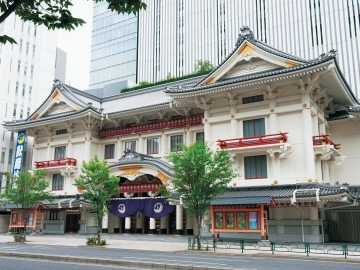
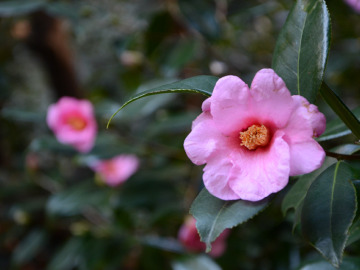
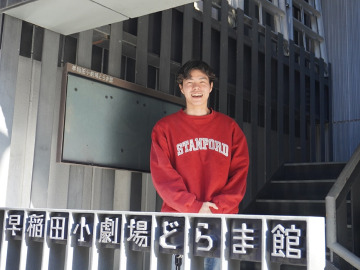
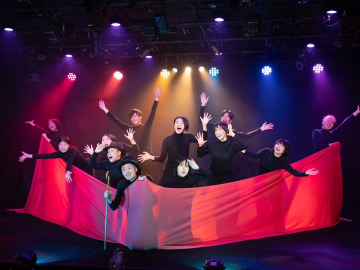

![[Save version] Map of the four main campuses](https://www.waseda.jp/inst/weekly/assets/uploads/2025/09/17cb2975123fc5103172ef60bd98608d-610x458.jpg)

